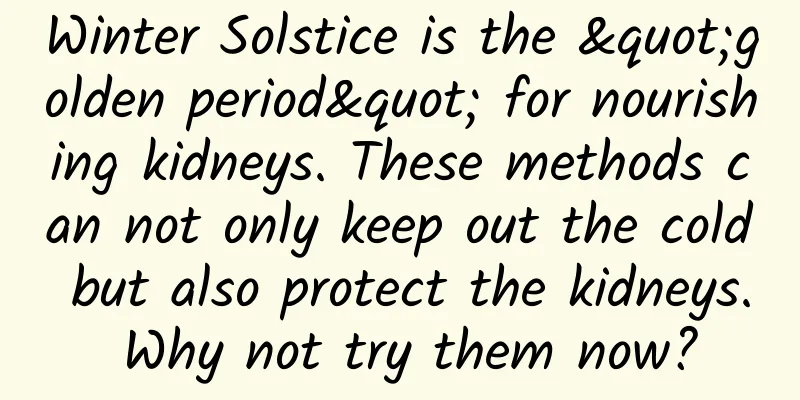Winter Solstice is the "golden period" for nourishing kidneys. These methods can not only keep out the cold but also protect the kidneys. Why not try them now?

|
The winter solstice is the last solar term of the year, and it is also a very important solar term for our kidney disease patients. The Yellow Emperor's Classic of Internal Medicine states that "the disease is in the kidney, and it is cured in spring, worse than summer, lasts in autumn, and starts in winter". The general idea is that if a person suffers from a kidney-related disease, he should be cured in the spring. If it is not cured in the spring, the condition will worsen in the summer, and the condition will stabilize in the autumn. Only in the winter will the kidney disease have hope of improvement. Therefore, kidney patients need to take better care of their kidneys around the winter solstice. The customs of the winter solstice vary across the country. In the north, people are used to eating dumplings. There is a saying among the people: "If you don't eat dumplings during the winter solstice, no one will care if your ears freeze off." In the south, people are used to eating glutinous rice balls. When the twenty-four solar terms reach the winter solstice, the yin reaches its extreme and the yang begins to grow. At this time, the yang in the human body is flourishing and is most susceptible to external influences. Therefore, kidney patients should start with diet to maintain their health before and after the winter solstice. According to TCM theory, the kidney is the foundation of the body's yin and yang. In winter, it is necessary to maintain sufficient energy to nourish and protect the kidney. Therefore, it is recommended that kidney patients eat more foods that can warm the body. For example, beef, mutton, dried ginger, ginger, nuts, etc. Dark or black foods such as black rice, black buckwheat, black beans, black sesame, black fungus, seaweed, kelp, and laver are balanced in nature and taste, nourishing but not greasy, and not dry. They can strengthen the kidneys and benefit the kidneys. These can also be eaten in moderation. In addition, traditional medicine believes that the five flavors of salt enter the kidneys, but after the winter solstice, when the yang energy is just born, it is not advisable to eat too salty. Western medicine also believes that a low-salt, high-quality protein diet will damage the kidneys. The Yellow Emperor's Classic of Internal Medicine also believes that "too salty taste will cause fatigue in the bones, short muscles, and depression of the heart." Secondly, ensuring adequate sleep helps to replenish kidney yang. The Yellow Emperor's Classic of Internal Medicine says, "In the three months of winter, go to bed early and get up late, and wait for the sun to come out. This is the response to the winter qi and the way to nourish and store." After the winter solstice, you should go to bed early and get up late, which is beneficial for the body to hide yang qi and store yin essence. Traditional Chinese medicine believes that when the body's yang is insufficient, people will love to sleep in winter. Yang is active and yin is quiet. When the yang is insufficient, the body tends to feel sleepy. The yang comes from the kidneys, so it is more important to take good care of the kidneys in winter. When the sleep quality is good, the kidney qi is sufficient, and the yang is abundant, people will be healthier. Secondly, scientific exercise can nourish kidney yang. "Movement generates yang", and it is very important to consolidate yang in winter. Scientific exercise and regular exercise are also one of the secrets to keep warm in winter. Appropriate exercise can well consolidate the yang in the body. It is recommended to participate in light exercise such as walking, Tai Chi, Ba Duan Jin, etc., and do it at your own pace. On sunny days, go out more to bask in the sun, which can strengthen the yang, warm the meridians, and maintain the stability of kidney disease. Wear a hat and scarf when going out, protect the Baihui point on the top of the head, the Fengchi point and the Fengfu point on the back of the head, and avoid cold air invading the "head of all yang". It is recorded in the "Book of Zhou": "Winter Solstice is the peak of Yin Qi". In the philosophy of Yin and Yang and the Five Elements, Yin and Yang are interdependent and mutually restrained. Winter Solstice, as the day of Yin, represents the time when Yin Qi is at its peak. At this time, moxibustion can better warm Yang Qi, warm the meridians and dispel cold, and improve the body's resistance to cold and disease. Kidney disease patients can moxibustion Shenque acupoint and Zusanli acupoint. Shenque acupoint is what we call the "navel", which is the root of the five internal organs, the place where the Ren and Chong meridians run, and the place where the Yuan Qi is stored. You can also moxibustion the bilateral Zusanli acupoints, which has the effect of nourishing the Yuan Qi, strengthening the body, and strengthening the kidneys. "The coldest days of winter" are the coldest. After the winter solstice, the cold is even worse. Especially this year is still a cold winter. Chronic kidney disease patients should protect themselves well, keep their kidney condition stable, and spend the winter safely and healthily! |
<<: [Cold wave is coming] How to dress to effectively prevent cold and keep warm?
Recommend
What should I do if I get stretch marks after giving birth?
After giving birth, mothers will have obvious str...
Causes of breast milk leakage
Many female friends may not be so clear about the...
23 weeks pregnant hard belly
A hard belly at 23 weeks of pregnancy is caused b...
There is a lump in the breast that hurts when pressed
There are many reasons why there are lumps in the...
Female right back pain below ribs
For women's pain below the ribs on the right ...
Symptoms of liver and gallbladder dampness and heat in women
When women are diagnosed with liver and gallbladd...
Cell Breakthrough: This newly developed diet produces immediate results in 3 weeks!
Compiled by: Gong Zixin Industrial diet High in p...
Is Kuntai Capsule useful for amenorrhea?
Amenorrhea is when your menstrual period stops, w...
What should pregnant women eat when they have toothache?
There are many factors that cause toothache. The ...
What is the cause of a pregnant woman's heart rate of 110?
Pregnant women are always the most worrying ones ...
Here comes the "strategy"! This article will teach you how to read the test report and protect your health
Experts from Hunan Second People's Hospital (...
How to reduce buttocks and thighs after childbirth
After giving birth, mothers will feel that their ...
Placental maturity level 3
The placenta is an essential nutrient transport o...
b-hcg human chorionic gonadotropin value
Human chorionic gonadotropin is actually HCG. Thi...
How to treat postpartum disease
Postpartum disease is actually a disease left ove...









